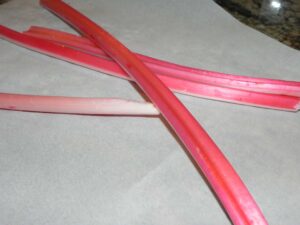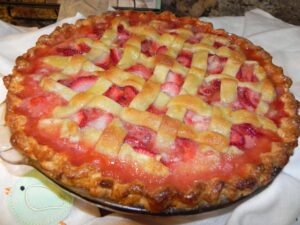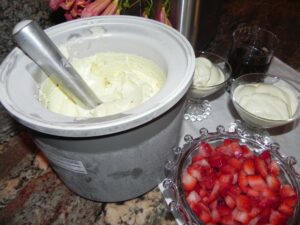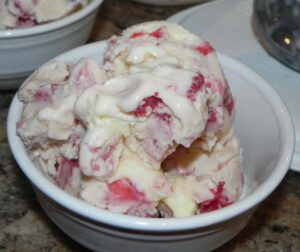SOUTHERNISM OF THE WEEK
She’s just paving the road: Not a reference to road repairs by the Highway Department … Instead, an observation that the individual is attempting to smooth over a situation to enable further developments, or to cover up something. In the South, more specifically, the expression has Biblical connotations, as in “The road to Hell is paved with good intentions (gone awry).”
Springtime is when every living thing perks up, sending out tentative shoots of new growth. Blossoms herald warm weather and beckon pollinators in order to initiate the cycle of fruiting and regeneration. Early fruits include many of the most coveted berries such as strawberries.
Thus far, it’s been an excellent Spring for local strawberries from Mississippi growers. Commercially grown varieties from Lucedale’s Eubanks Farms have filled local stores since early April. Pick-your-own strawberry fields have been open for weeks and are nearing the end of their availability this week.

Another tasty harbinger of Spring is rhubarb. Alien to most native Southerners, rhubarb is a cool-weather crop, flourishing in parts of the Northwest, the upper Midwest and Ontario, Canada. And there’s an interesting and atypical variety that flourishes in the Texas Panhandle.
Rhubarb originated in Asia about 2,000 years ago and was used medicinally as a laxative stomach medicine. Traders considered it more valuable than opium and spices, and it was transported westward into Russia and eventually into the United Kingdom. Starting in the 18th century, the British cross-bred the plant to reduce its toxicity and enhance its sweetness.
The plant is particularly attractive, with brightly colored edible stalks ranging from green and pink to crimson, rising from rhizome roots and terminating in bright green leaves. The leaves and rhizomes contain potentially toxic amounts of oxalic acid crystals, which cause swelling of the tongue and difficulty in breathing.
Although it’s a vegetable similar to celery, Americans tend to treat it as a fruit. The stalks are tart in flavor, and pair well with citrus and other fruits such as strawberries and apricots. The plant has an attractive, fruity fragrance often incorporated in perfumes. An odd characteristic of the rhubarb plant is that we literally can hear it grow.
Our local Kroger store carries rhubarb seasonally, but it sells out quickly. The day I purchased my selection, two other shoppers came over and chatted about their childhood memories of consuming rhubarb sliced and dipped in sugar, or cooked into jellies and desserts. It became apparent to me that the delicate rhubarb inspires devotion and region-specific food memories.
Know Your Rhubarb
Select tender stalks, with bright color. Gently rinse. Cut off both ends. Cut into quarter-inch or half-inch pieces. Rhubarb is like celery in that the more mature the petioles (stalks), the more fibrous they become. If the rhubarb seems fibrous when cutting it, carefully peel the exterior layer to remove the fibers. It should peel easily.
Tips About Strawberries
Select the brightest strawberries because strawberries do not continue to ripen once picked. The seeds should be light colored; seeds that have turned dark indicate that the berries are past prime. Rinse only when ready to use. Cut off caps. Slice either vertically or horizontally. If the berries are large, quarter the slices.
AUNT RUTHIE’S STRAWBERRY-RHUBARB PIE
Aunt Ruth became fond of rhubarb pie when she and Uncle Bill spent a year in Washington State, where rhubarb flourishes. This strawberry-rhubarb pie recipe was adapted from a 1948 Better Homes & Gardens cookbook.
 3 c chopped rhubarb (3 to 6 stalks, depending on size)
3 c chopped rhubarb (3 to 6 stalks, depending on size)
2-1/2 to 3 c sliced strawberries
1 c white granulated sugar
1/3 c all-purpose flour (or substitute 1/4 c cornstarch or 2 T tapioca flour)
1/4 c orange juice
2 T chilled, salted butter, cut into 16 pieces
2 frozen pie crusts, thawed
1 tsp orange or tangelo zest
1-1/2 tsp sugar
1 egg yolk, beaten with 1/2 T water
Preheat oven to 450˚F. Prepare piecrust by adding half the zest and forming a ball of one thawed pie crust. Roll it out between sheets of wax paper. Turn into a 9-1/2-inch deep-dish pie pan. The sides won’t quite overlap the pan edges. Repeat process with the second pie crust, rolling out into a circle about 1/8-inch thick.
Trim about an inch from the outer edge of the second pie crust and add it to the edges of the original pastry lining the pie pan. Cover pan loosely with plastic wrap and place in the freezer for about 10 minutes. Do the same with rolled-out second pastry.
Mix the strawberries and rhubarb with sugar, flour (or substitute) and orange juice. Allow to sit for about 5 minutes. Remove pie crust from freezer and prick bottom with a fork to prevent puffing.
Pour fruit mixture into the chilled pastry. Dot butter pieces evenly over the mixture. Cut chilled second pastry into half-inch-wide strips. Weave the strips into a lattice over the fruit. Moisten finger and crimp lattice edges to piecrust. Fold pastry edges and use fingers to crimp evenly around pie rim. Lightly brush egg glaze over crust and lattice. Place pie on a baking sheet and bake in oven for 15 minutes. Reduce heat to 375˚F and continue baking about 30 minutes.
Loosely tent foil over pie and continue baking about 15 minutes until crust is golden and filling is bubbling. Remove from oven and cool on a rack before serving. Refrigerate unused portion.
STRAWBERRY BUTTERMILK ICE CREAM
We’ve discussed buttermilk ice cream in the past, but this version is adapted from the classic Claudia Fleming version in her cookbook, The Last Course: The Desserts of Gramercy Tavern. I use a tabletop automatic ice cream maker for this recipe, stirring in fresh, sugared strawberries once the ice cream is made. The results are incredible.
1-1/4 c white granulated sugar
10 large egg yolks
2 c whole Bulgarian buttermilk
1 vanilla bean
Pinch of salt
1 tsp vanilla extract
2 c diced strawberries
1/2 c white granulated sugar
Combine cream and 1 c of first sugar in a large saucepan. Use a paring knife to split open the vanilla bean; scrape vanilla bean contents into the pan of cream. Bring to a simmer on medium heat, stirring with wooden spoon at intervals to prevent scorching.
 Whisk egg yolks with remaining 1/4 c of first sugar in a separate bowl. Remove simmering cream mixture from heat. Drizzle a small amount into the egg yolks, whisking continuously to prevent curdling.
Whisk egg yolks with remaining 1/4 c of first sugar in a separate bowl. Remove simmering cream mixture from heat. Drizzle a small amount into the egg yolks, whisking continuously to prevent curdling.
Repeat three to four times, whisking to warm the yolks before pouring the yolk mixture into the remaining cream in pan. Keep whisking slowly, and cook on low heat until mixture becomes thick enough to coat back of a wooden spoon.
Strain the mixture and whisk in the buttermilk, vanilla extract, and salt. Pour into the ice cream freezer and chill overnight or at least 4 hours, covered.
Just prior to making the ice cream, combine diced strawberries and last sugar. Remove chilled ice cream mixture from fridge and make ice cream according to manufacturer directions. Mine takes about 20-25 minutes.
Slightly mash the sugared strawberries and spoon into thefresh churned ice cream. Fold gently until mixed. Serve immediately or freeze until ready to serve.
Laurie Triplette is a writer, historian and accredited appraiser of fine arts, dedicated to preserving Southern culture and foodways. Author of the award-winning community family cookbook GIMME SOME SUGAR, DARLIN’, and editor of ZEBRA TALES (Tailgating Recipes from the Ladies of the NFLRA), Triplette is a member of the Association of Food Journalists, Southern Foodways Alliance and the Southern Food and Beverage Museum. Check out the GIMME SOME SUGAR, DARLIN’ website and follow Laurie’s food adventures on Facebook and Twitter.



